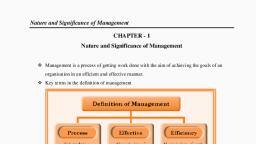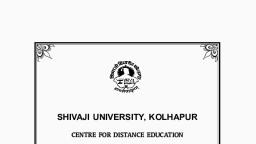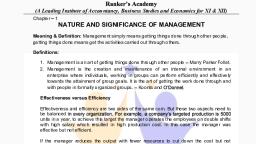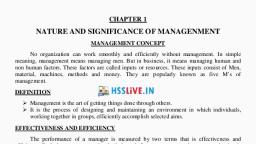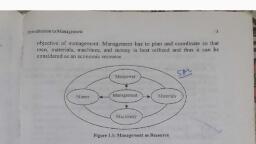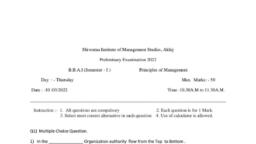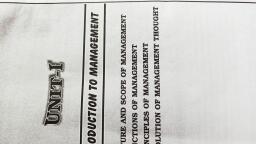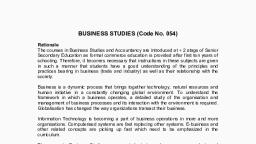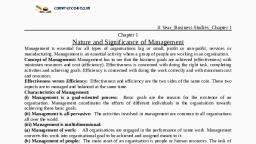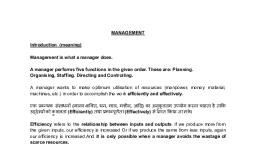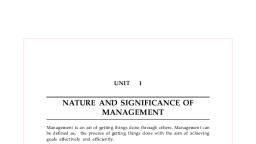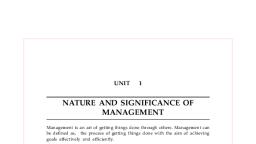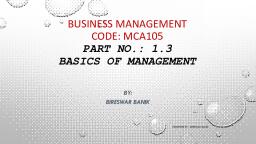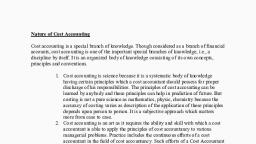Page 1 :
Mob No.:-99150-02300, , Manu Vatika, DAY BOARDING SR.SEC. SCHOOL (PSEB WING),, , BUDHLADA-151502, Class:- 12TH, , Sub:- BUSINESS STD., , Teacher's Name :-MR. LOVENEET, , bUSINESS sTUDIES cLASS 12TH nOTES., , CHAPTER -1 - NATURE AND SIGNIFICANCE OF MANAGEMENT, , Organisational Objectives: Organizational Objectives can be divided into Survival (Earning, enough revenues to cover cost); Profit (To cover cost and risk); and Growth (To improve its future, prospects)., (a) Survival: Earning enough revenues to cover cost. Management by taking positive decisions, with regard to different business activities ensures survival of business for long term., (b) Profitability: Earning adequate profit in order to survive and grow. Profits provide a vital, incentive for the continued successful operation of the enterprise, (c) Growth: Growth indicates how well it exploits the potential opportunities. Growth of a business, can be measured in terms of sales volume increase, number of employees, products etc., Social Objectives: Is to provide quality products at reasonable rates and generating employment, opportunities for disadvantaged sections of society. To provide basic amenities like schools and, crèches to employees and by using environmental friendly methods of production., Personal Objectives: Includes meeting the financial needs like competitive salaries and perks, and Social and safety needs of the employee like basic amenities, peer recognition etc.
Page 2 :
(i) Helps Achieving Group Goals:- It integrates the objective of individual along with, organisational goal., (ii) Increases Efficiency:- It increases productivity through better planning, organising,, directing the activities of the organisation., (iii) Creates a Dynamic Organisation:- Organisation have to survive in dynamic, environment thus manager keep changes in the, organisation to match environmental changes., (iv) Helps in Achieving Personal Objectives:- Through motivation and leadership,, management helps in achieving the personal, objectives., (v) Helps in the Development of Society:- It provides good quality products and services,, creates employment, generate new technology, in that sense it helps in the development of the, society.
Page 3 :
NATURE OF MANAGEMENT, 1. Management as an Art:- Art refers to skillful and personal application of existing, knowledge acquired through study, observation and experience., The features of art are as follows:, a. Existence of theoretical knowledge: In every art, Systematic and organized study material is, available to acquire theoretical knowledge and experts in the respective fields apply these, principles to their respective art forms., b. Personalized application: The use of basic knowledge differs from person to person and thus,, art is a very personalized concept., c. Based on practice and creativity: Art involves creativity and practice of the experts. For e.g., the music created by musicians are different though the musical notes used are the same., Every manager has his own unique style of managing things and people. He/she uses his, creativity in applying management techniques and his skills improve with regular, application. Since all the features of art are present in management. So it can called an art., , 2. Management as a Science:- Science is a systematized body of knowledge that is based, on general truths, which can be tested anywhere, anytime., The features of Science are as follows:, a. Systematized body of knowledge: Science has a systematized body of knowledge based on, cause and effect relationship., b. Principles based on experiments and observation: Scientific principles are developed, through experiments and observation., c. Universal validity: Scientific principles have universal validity and application. Management, has systematic body of knowledge and its principles are developed over a period of time based on, repeated experiments & observations which are universally applicable but they have to be, modified according to given situation., As the principles of management are not as exact as the principles of pure science, so it may be, called-an inexact science. The prominence of human factor in the management makes it a Social, Science., , 3. Management as Profession:- Profession means an occupation for which, specialized knowledge and skills are required and entry is restricted. The main features of, profession are as follows:, a. Well-defined body of Knowledge: is complete set of principles, concepts, terms and activities, that make up a professional domain., b. Restricted Entry: The entry in every profession is restricted through examination or through, educational degree., c. Professional Associations: All professions are affiliated to a professional association, which, regulates entry and frames code of conduct relating to the profession. Eg. IMA, ICAI, d. Ethical Code of Conduct: All professions are bound by a code of conduct, which guides the, behavior of its members., e. Service Motive: The main aim of a profession is to serve its clients. Management does not, fulfill all the features of a profession and thus it is not a full-fledged profession like doctor, lawyer,, etc.
Page 4 :
Levels of Management, (i) Top Management It consists of senior most executives who are usually referred to as the, Chairman, Chief Executive Officer, President and Vice President.
Page 5 :
(ii) Middle Management They are usually division heads who are the link between top and, lower level of management., (iii) Operational Management They are usually the foremen and supervisors who actually, carry on the work or perform the activities., , Functions of Management, , (i) Planning:- It refers to deciding in advance what to do, how to do and developing a may of, achieving goal efficiently and effectively., , (ii) Organising:- It refers to the assigning of duties, grouping tasks, establishing authority, and allocating of resources required to carry out a specific plan., , (iii) Staffing:- It implies right people for the right job., (iv) Directing:- It involves leading, influencing, motivating employees to perform the task, assigned to them., , (v) Controlling:- It refers to the performance measurement and follow up actions that keep, the actual performance on the path of plan.

